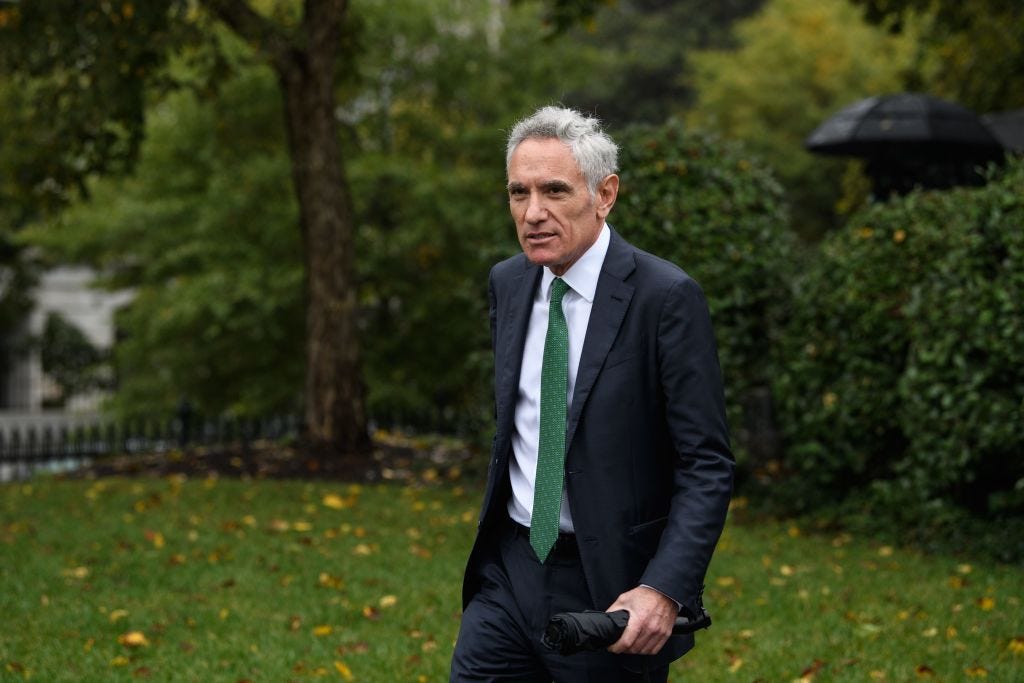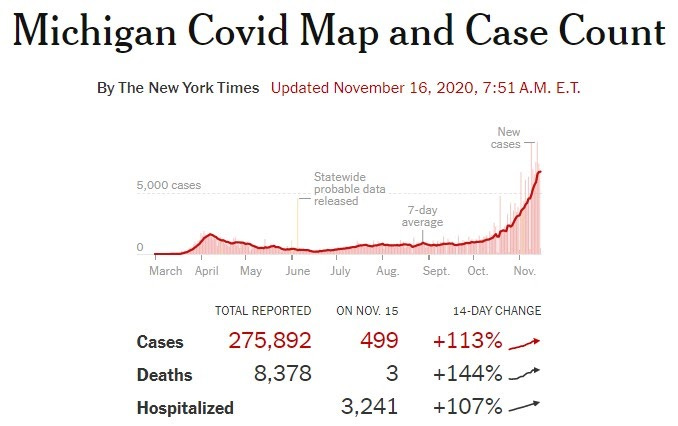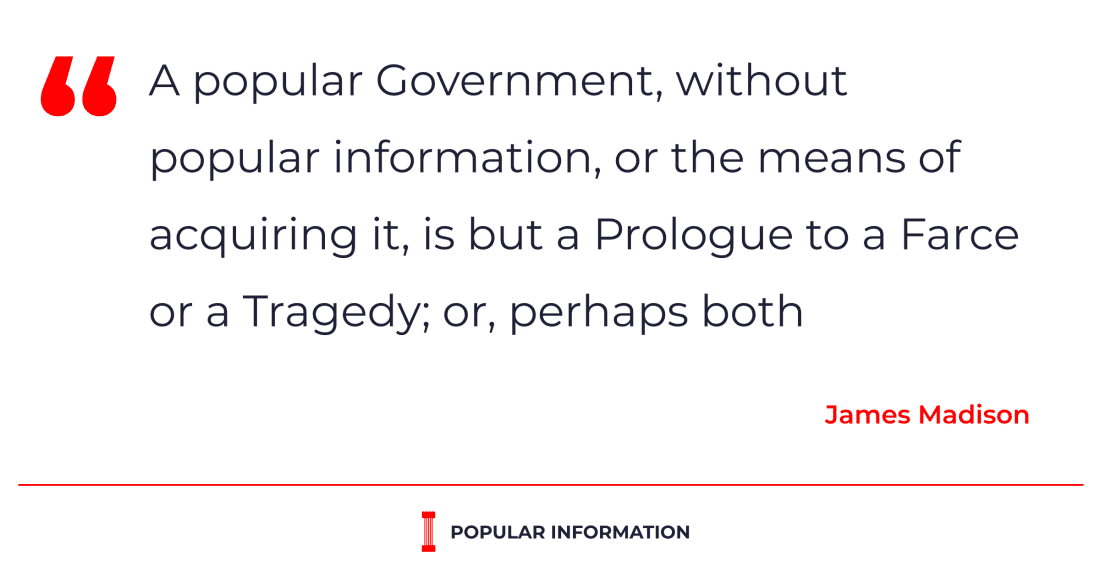In 64 days, the Trump administration will be over. But that is still a lot of time to inflict damage on the American people — particularly during a raging pandemic. This week, Dr. Scott Atlas, the Stanford radiologist who became Trump's top COVID-19 adviser, is using menacing language to undermine efforts in Michigan to slow the spread of the virus.
Michigan, like many areas of the country, has seen an exponential increase in COVID-19 cases in recent days. Over the last two weeks, cases, hospitalizations, and deaths are all up over 100%.
On Sunday, Michigan Governor Gretchen Whitmer (D) announced some new common-sense restrictions for a three-week period to save lives. Under Whitmer's order, colleges and high schools will shift to remote learning, casinos and bowling alleys will close, and indoor gatherings will be limited to 10 people. But retail stores, Pre-K through eighth-grade classrooms, and hair salons will stay open.
The announcement was quickly attacked by Atlas on Twitter, who encouraged residents to "rise up" and oppose Whitmer's order.
Atlas' rhetoric is especially disturbing because Whitmer has faced serious threats from right-wing extremists. Last month, "federal and state officials arrested 14 men in connection with an alleged plot to kidnap Whitmer and put her on trial for 'treason.'" Authorities say the men "were connected with armed anti-government groups and saw Whitmer as 'a tyrant' because of emergency orders she had issued to control the coronavirus." A few hours after his initial tweet, Atlas claimed he would never "endorse or incite violence."
Whitmer said Atlas' tweet was "incredibly reckless," but she would not be deterred. "We know that the White House likes to single us out here in Michigan, me out in particular. I’m not going to be bullied into not following reputable scientists and medical professionals,” she said.
Atlas doles out opinions as if he is an infectious disease expert — but he is not. As Popular Information reported in September, Atlas' 159-page CV contains no references to "epidemiology," "epidemic," "virus," or "viral." He became the most influential White House voice on the virus not because of his training or knowledge but because he told Trump what Trump wanted to hear.
Atlas' tweet encouraging Michiganders to ignore a modest government order — like much of his advice — may kill people.
Atlas' atrocious advice
The simplest and most effective step people can take to stop the spread of COVID-19 is wearing a mask in public settings. The CDC recently summarized the scientific evidence that masks can not only prevent people from spreading COVID-19 but also protect people from contracting it. Multi-layer cloth masks "block release of exhaled respiratory particles into the environment, along with the microorganisms these particles carry" and "can also reduce wearers’ exposure to infectious droplets through filtration, including filtration of fine droplets and particles less than 10 microns."
In August, however, Atlas tweeted, "Masks work? NO." He included a link to a rambling article published by the libertarian think tank American Institute for Economic Research, a frequent source of COVID misinformation. The tweet was removed by Twitter for violating its health misinformation policies.
Atlas has also argued against testing asymptomatic people who have been exposed — a key step in stopping the spread of the virus — because he wants asymptomatic carriers of COVID-19 to keep working. He successfully convinced Florida to substantially reduce the number of people tested in the state.
His opposition to testing potential asymptomatic carriers may be part of a broader push by Atlas to let the virus spread as widely as possible. The Washington Post reported that Atlas advocated "allowing infections to spread naturally among most of the population while protecting the most vulnerable and those in nursing homes until the United States reaches herd immunity." Atlas denies that he supports a "herd immunity" strategy but endorsed "the 'Great Barrington Declaration,' which effectively promotes a herd immunity strategy." Adopting such a strategy would likely result in "hundreds of thousands of excess deaths."
Appearing on Fox News on Monday night, Atlas encouraged large family gatherings for Thanksgiving. “For many people, this is their last Thanksgiving," Atlas said.
An issue of medical ethics
Atlas' conduct is so egregious that he may be violating the American Medical Association’s (AMA) Principles of Medical Ethics. Dr. Krutika Kuppalli, a professor at the Medical University of South Carolina, told Popular Information that Atlas is “violating the guidelines for ethical physician conduct in the media.”
First and foremost, Dr. Atlas is a neuroradiologist with no experience or training in infectious diseases or epidemiology... He is practicing beyond the scope of expertise which violates the AMA guidance which states that information they provide should be "commensurate with their medical expertise" and should be confined to their "area(s) of expertise." Additionally, he has repeatedly promoted misinformation stating masks are ineffective… Finally, he has most recently promoted violence against the governor of Michigan, advising people to "rise up" due to new public health guidelines to help control the surging pandemic. This does not uphold the values, norms, and integrity of the medical profession.
Dr. Leana Wen, an emergency physician and public health professor at George Washington University, told Popular Information that Atlas has "has an ethical obligation to provide accurate information based on science."
How Stanford became the epicenter for COVID misinformation
Atlas is not the only person affiliated with Stanford University that is contributing to misinformation about the pandemic.
Dr. Jay Bhattacharya, a former fellow at the Hoover Institution and a current Stanford professor, has been an outspoken opponent of mitigation measures since the beginning of the pandemic. In April, Bhattacharya, along with other Stanford colleagues, published a non-peer-reviewed study suggesting that COVID-19 infections were actually 85 times higher in Silicon Valley than previously reported and therefore was no more dangerous than the flu. Dr. John Ioannidis, a Stanford professor and co-author of the study, suggested in April that the results indicate that the coronavirus is “not the apocalyptic problem we thought.”
The study went viral but received harsh criticism from experts who questioned the researchers’ methodologies. A month later, BuzzFeed News’ Stephanie Lee revealed that Bhattacharya and Ionannidis’s study was funded in part by JetBlue founder David Neeleman – an outspoken opponent of travel restrictions. In October, it was Bhattacharya who spearheaded the Great Barrington Declaration, which advocates a herd immunity strategy.
Richard Epstein, a senior fellow at Hoover and right-wing law professor, predicted in March that only 500 Americans would die from the virus. The piece was circulated among Trump administration officials, according to the Washington Post. Epstein would go on to revise this projection a week later, projecting the total number of COVID-19 deaths at 5,000 and then 50,000. In April, Epstein wrote that “the response of the state governors to the coronavirus outbreak has become far more dangerous than the disease itself.” He argued that the death count was exaggerated and that lockdowns were not really needed.
Stanford faculty speak out against Atlas
In September, a group of Stanford faculty members publicly criticized Atlas in an open letter for spreading “falsehoods” regarding the coronavirus. The letter was signed by 98 Stanford researchers and physicians. (Atlas threatened to sue the signatories for defamation.)
To prevent harm to the public’s health, we also have both a moral and an ethical responsibility to call attention to the falsehoods and misrepresentations of science recently fostered by Dr. Scott Atlas, a former Stanford Medical School colleague and current senior fellow at the Hoover Institute at Stanford University. Many of his opinions and statements run counter to established science and, by doing so, undermine public-health authorities and the credible science that guides effective public health policy.
Meanwhile, other Stanford faculty members are calling on the university to re-examine its relationship with the Hoover Institution. “These statements [from fellows at the Hoover Institution] dangerously downplay the deadly nature of the disease and recommend policies that seem more aligned with driving a particular policy position than with science or fact,” wrote faculty in a letter.
One professor, David Spiegel, asked “why the university had not sanctioned Atlas or publicly disputed his statements about COVID-19.” According to Stanford News:
He said, “Atlas’ conduct is not merely a matter of expressing an opinion – it is a violation of the American Medical Association’s Code of Ethics.” Spiegel also believes Atlas’ actions may violate the Stanford Code of Conduct, which holds each member responsible for “sustaining the high ethical standards of the institution.” Further, he has charged that Atlas has inappropriately leveraged his relationship to Stanford to assert a health care expertise he does not have.
Stanford University President Marc Tessier-Lavigne responded by citing the university’s Statement on Academic Freedom. In a new statement released Monday, Stanford said that Atlas "has expressed views that are inconsistent with the university’s approach in response to the pandemic," and "Atlas’s statements reflect his personal views, not those of the Hoover Institution or the university."





